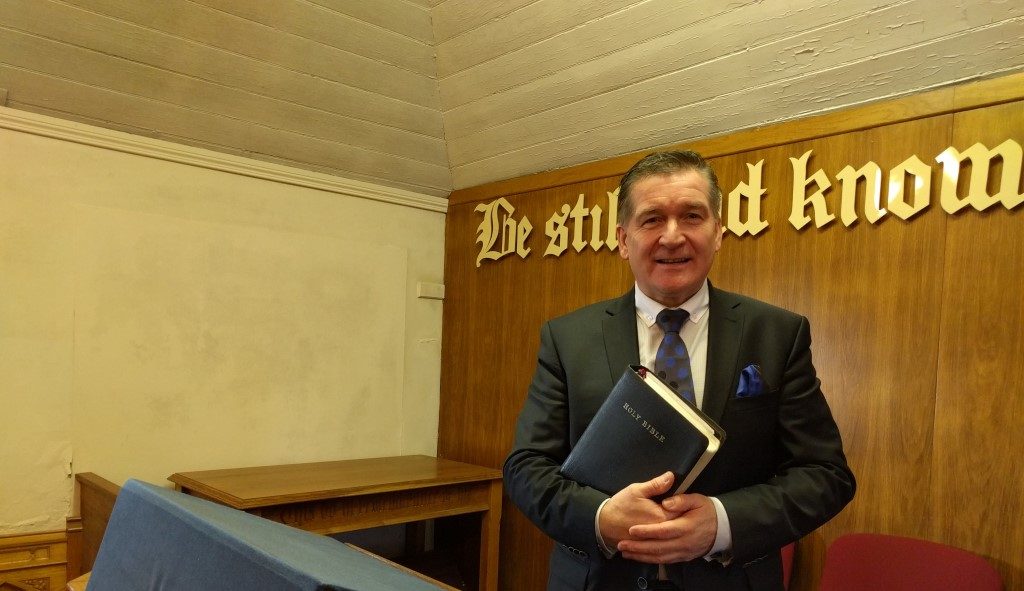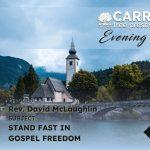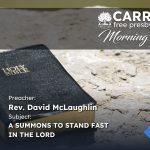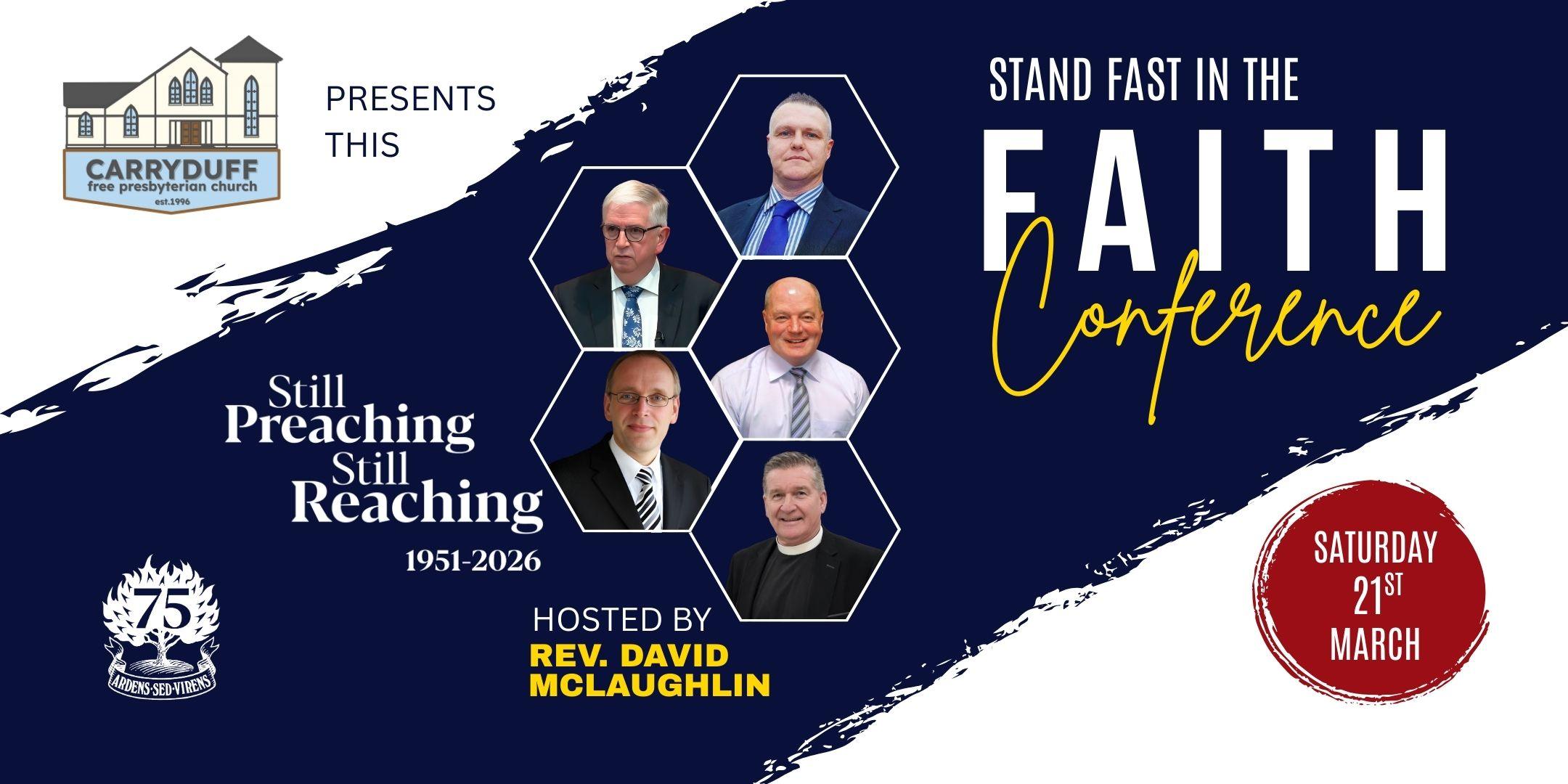Date: SUN 7:00 PM 4th May 2025
Preacher: Rev. David McLaughlin
Bible Reference: 1 Corinthians 16:13
Watch ye, stand fast in the faith, quit you like men, be strong.
Summary of the Sermon: “Stand Fast in the Faith” (1 Corinthians 16:13)
Text and Theme: The sermon is based on 1 Corinthians 16:13, with the theme “Stand Fast in the Faith.” The key verse reads, “Watch ye, stand fast in the faith, quit you like men, be strong,” with an additional note from verse 14, “Let all things be done with charity.” The preacher presents this as a call to spiritual vigilance and steadfastness for the Free Presbyterian Church and its members.
Introduction and Context:
- The sermon begins with a question: “What does the Free Presbyterian Church stand for today?” The preacher affirms that the church was divinely established in 1951 in Ulster to preach the gospel faithfully, oppose Roman Catholicism, apostasy in mainline Protestant denominations, sin, carnality, dead orthodoxy, and hyper-Calvinism.
- The church was founded on Reformed doctrine, Presbyterian governance, and evangelistic practice, standing apart from ecumenical bodies like the World Council of Churches. Leaders like Dr. Ian Paisley and others were committed to preaching the Bible, calling for repentance, faith, and restoration.
- The church grew rapidly, forming new congregations and advancing God’s work through biblical preaching, worship, separation unto the gospel, and ministries for all ages, including missions and Whitfield College of the Bible.
- However, 74 years later, the church faces challenges as a new generation questions its purpose. The evangelical landscape in Northern Ireland is shifting, with some churches confused about the true gospel, compromised by worldliness, or corrupted by heresy.
Biblical Context:
- The sermon draws from Paul’s first letter to the Corinthian church, which faced issues like division, immorality, disorder, and misuse of spiritual gifts. Paul’s closing exhortations in 1 Corinthians 16:13-14 address these problems with four military-themed commands: watchfulness, steadfastness, manliness, and strength.
- The preacher connects these commands to the Christian life as a spiritual battle, not a physical war, emphasizing that believers are soldiers in a war against spiritual forces (Ephesians 6:12). The Free Presbyterian Church, like the Corinthian church, is called to remain vigilant and faithful amidst opposition, false doctrines, and worldly pressures.
Main Points: The sermon expounds on the four commands in 1 Corinthians 16:13, each with military overtones, as a charge to the church and individual believers:
- Command to Watchfulness (“Watch ye”):
- This is a call to stay alert and avoid spiritual apathy or indifference, likened to a soldier who must not fall asleep on duty. Falling asleep risks allowing the enemy—Satan, the world, or the flesh—to infiltrate.
- Paul himself modeled watchfulness, aware of adversaries in Ephesus (1 Corinthians 16:8-9). The preacher cites examples like Saul’s vulnerability when asleep (1 Samuel 26) to underscore the danger of spiritual slumber.
- Believers must watch for external threats (the world’s influence, Satan’s attacks) and internal weaknesses (the deceitful heart). They should also watch positively for opportunities to counsel souls and anticipate Christ’s return (Matthew 24:42).
- Modern churches often neglect watchfulness, embracing false tolerance or compromising fundamental doctrines like justification by faith alone.
- Command to Steadfastness (“Stand fast in the faith”):
- This calls for perseverance in defending “the faith”—the body of biblical doctrine (Jude 3). It involves standing firm on truths like the inerrancy of Scripture, salvation through Christ alone (John 14:6), justification by faith, repentance, sanctification, separation, and the second coming.
- The preacher warns against pluralism and relativism, urging the church to hold fast to absolute truth (John 17:17; Proverbs 23:23). In a culture that dislikes dogmatism, believers must be unwavering, even when fundamental doctrines are debated or diluted (e.g., new perspectives on Paul or eternal punishment).
- Command to Manliness (“Quit you like men”):
- This is a charge to act with courage, boldness, and strength, likened to a soldier’s valor. It applies to the entire church—pastors, elders, deacons, and members, including women—to be vigilant and valiant.
- The preacher cites historical examples like Hugh Latimer and Nicholas Ridley, who faced martyrdom bravely, and George Whitefield, who endured persecution. Ezekiel 22:30 highlights God’s search for courageous men.
- Modern churches often shy away from this call, with some Bible translations softening the language to avoid masculine imagery. The preacher emphasizes the need for heroism and gallantry in spiritual warfare.
- Command to Powerfulness (“Be strong”):
- This calls for spiritual, mental, and emotional strength to endure opposition, not just physical might. Weakness leads to discouragement and loss of will, but strength enables believers to withstand attacks from worldly governments, media, and cultural elites.
- Jesus warned of persecution (John 15:18-20), and Paul affirmed that godly living invites opposition (2 Timothy 3:12). Believers need God’s peace and spiritual resilience to stand firm in a hostile world.
Conclusion:
- The sermon concludes by reinforcing that Christians are in a spiritual war, called to be soldiers in Christ’s army. The four commands—watchfulness, steadfastness, manliness, and strength—are essential for the Free Presbyterian Church to remain faithful 74 years after its founding.
- The preacher challenges listeners to confirm their enlistment in the Lord’s army through repentance and faith in Christ. He emphasizes the church’s need for committed members, especially young men, to wage spiritual warfare against the world, flesh, and devil.
- The call to “stand fast in the faith” remains as urgent today as in 1951. The preacher invites believers to accept this charge and serve faithfully until Christ calls them home.
Additional Notes:
- The sermon ties into the upcoming VE Day, framing the Christian life as a battle requiring military discipline.
- The preacher plans to follow up with a sermon on standing fast in freedom, further connecting to VE Day themes.
- The tone is urgent and exhortative, reflecting concern for the church’s fidelity in a changing cultural and ecclesiastical landscape.
Subscribe to the podcast here:
Spotify Podcasts | Apple Podcasts | Pocket Casts
Email | RSS | more information here







